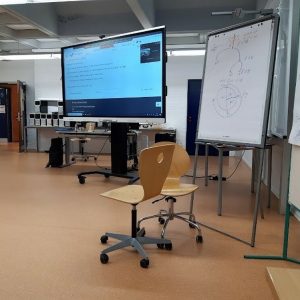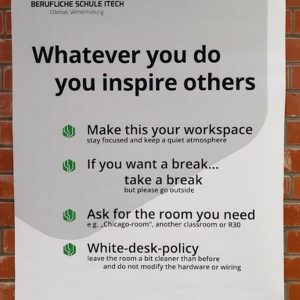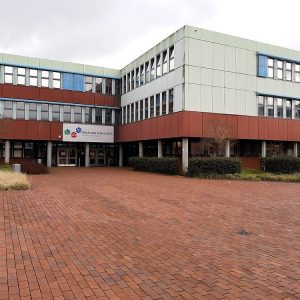Job Shadowing Besuch aus Prag 2022
Description of the school
Berufliche Schule ITECH is a professional school with a focus on information technology, electrical engineering, and chemistry. The school educates around 1,400 students between the ages of 16 and around 40, most of whom are around 20 years old. The education system is built with an emphasis on practice and 2/3 of the time is spent by students in cooperating companies and only about a third of all students participate in education directly at school. Teaching is designed for 3 years, but this is not the rule. Specialized courses are also held at the school.
In the field of informatics, there are currently three possible directions – application development, networks and electronics of IT systems – and the offer will be expanded for the next year by two more directions – Big Data and IoT.
For teaching, the school prides itself mainly on providing facilities and this corresponds to the extensiveness of the building and its amenities. Everything for both students and school employees – they do not have a teacher’s office as is ordinary in the Czech system, but they have a large open space where everyone can meet, which is currently expanding to the next floor. All classrooms and laboratories are equipped with modern technology, especially touch hybrid sets for offline and online lessons at the same time, which were used in every lesson during my visit. There are also computers, sets of electronic kits, 3D printers, a network, and other necessary and above-standard equipment.
It is important to emphasize that most teachers are originally from practice and therefore have a sufficient professional basis and overview for teaching their subjects. Wednesday afternoons are set aside for short meetings within groups where the content of the courses is discussed. I could even take part in one of these, albeit passively. Furthermore, to prepare and develop the skills of the teaching staff, they use the ongoing teaching, so that teachers of various subjects can get acquainted with all the areas taught here.
Lesson structure
During the activity, I had the opportunity to visit several lessons led by German colleagues – mostly software development (UML diagrams), but also security in IT (hashing, security conditions, protocols, data transfers via ethernet framework) and development on the Arduino kit. During the date of the visit, preparations for the final exams took place, and therefore the impression of teaching was reduced mainly by otherwise frequent practical projects. I spent the first two days in German-speaking classes and the last day in a bilingual classroom, i.e., in a fully English-speaking class.
Overall, the teaching is conceived as a strongly professionally oriented and technical subjects occupy approximately 2/3 of all content within the field of informatics. Freedom is widely used in the lessons and the focus is on the independence and personal responsibility of everyone. Ordinary, the lesson is structured into longer, mostly four-hour blocks, in which small breaks are often made during the course according to current needs – for example, if a major error occurs in the middle of the student’s presentation, a 10- to 20-minute-long break is introduced, which serves to correct and continues only after that. However, everyone can take a break at any time at their own discretion.
More classrooms are also used for the course of lessons at the same time – for example, at the visited lesson with work with Arduino, the students were divided into several groups and used a total of three rooms for work so that no one disturbed anyone at work – the teacher then gradually walked around them, or the students themselves sought him out.
Teaching at a partner school
For my activity, I agreed with the teachers on a presentation from my professionally focused area – web development – which I presented to several groups within two days. The content was a view of the software development process from the perspective of a web application developer with an emphasis on agile development, communication with the client and efficiency, respectively minimization of data transfer, server-side and client-side loads and avoidance of unforeseen, unlikely, and often easily overlooked errors that arise during higher load and rapid sequence of events. The final part of my presentation was the presentation of the projects we do with students in my web application creation classes.
For the presentation, I mainly used the above-mentioned touch hybrid set and due to the smaller size of the groups, a fruitful and targeted discussion always followed. I led the lessons both in the bilingual class and in the German-speaking class because no one had the slightest problem with a smooth switch to English.
I also participated in the opportunity to go through projects with one teacher in the lower grades and ask questions within the moSCoW method used, which was deployed during the lessons, and which serves for prioritization and output requirements that are defined by the students themselves and the teacher serves more as a mentor.
On the last day, I also contributed practical demonstrations to the teaching of safety in a bilingual classroom, which were complemented by a theoretical explanation by a German colleague.
Benefits and evaluation of mobility
Mobility has certainly been more than beneficial overall, for several reasons. I had the opportunity to get acquainted with another educational system, its positives, and negatives. To meet a wide range of German colleagues from different specializations and talk to them on the topic of education. I learned about the various projects the school runs – mostly international hackathons – and I saw their results.
I continued to witness and actively participate in a considerable number of hours within my professional field conducted in a different angle than I am normally used to from the Czech educational environment. Within the lessons, I was able to be inspired by the way of teaching – both professionally and in terms of management of lessons in terms of time, communication, and organization. The emphasis on independence and freedom in studying has obviously proven itself very well here, and this is also evidenced by the atmosphere here, and the role of the teacher thus becomes a significant part of the teaching more in the role of a consultant and mentor. I consider this experience to be clearly the most beneficial part of the whole mobility.
I had the opportunity to lead my own teaching and complement other teachings, which helped me to develop my skills in the professional and communication area.
And the last positive aspect mentioned is, of course, to spread awareness of another culture and to practice and improve language skills, both in English and German.




